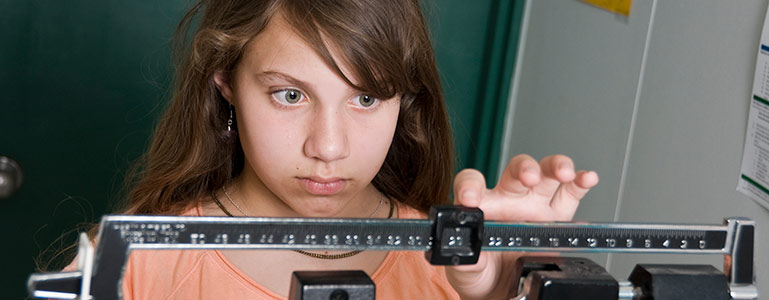Poor body image is epidemic among girls and women in this country: 94% of women report having a negative body image and wanting to change something about their bodies, and 98% think negatively about their bodies at least once a day. How you can ensure that your child has a healthy relationship with her body now and throughout her development?
Be a Role Model
How you feel about your body has direct impact on how your daughter will feel about hers. If you are constantly trying to change your body and expressing frustration, dislike, or criticism about your appearance, you are sending a message to your daughters that bodies are to be judged and conformed rather than accepted, loved, and appreciated.
Though your feelings are often modeled in very subtle ways, you are probably not hiding them from your perceptive child. She will notice when you sigh or make a face while looking at yourself in a mirror; when you dismiss a complement; when you say “Oh, I shouldn’t have eaten that!” She will notice whom you describe as beautiful and whom you don’t. She will remember when you express longing for the flat stomach, firm thighs, or slender build of a friend, a stranger, that woman in the magazine. Be mindful of how much this seeps into your interactions with, and around, your daughter.
Appreciate Rather than Evaluate
We live in a society that objectifies and evaluates bodies using a narrow and unattainable definition of beauty. We need to teach our daughters that they can view their bodies through a different lens. Rather than a lens of evaluation, create one of appreciation.
Help your daughter identify what she appreciates about her body. Viewing her body through this lens means your daughter can appreciate what her body can do rather than what it looks like. She will appreciate her uniqueness, and she will not need to compare herself to some ideal image.
This appreciation process can start as early as preschool and can continue into adulthood. Start by identifying the power, strength, and ability in your daughter’s body. For daughters in preschool, introduce this lens of appreciation by giving them a way to recognize what their bodies can do: Look how strong your legs are; you can jump so high! Look how fast you can run! You can move your body to the music. Replace some of the “You are so pretty” commentary directed at your daughter with “Look what your body can do” language.
As your daughter moves into elementary school, expand and solidify the lens of appreciation by starting a daily body appreciation ritual. Each day, express something you both appreciate about your body — i.e., that you can use it to ride your bike, that you can dance and do karate, that you love your curly hair or freckles. It can be a bedtime ritual or something your daughter writes in a journal each day and then reads to you.
Counter the Media Culture
While kids are bombarded with ever-present media, we can help to counteract the negative impact by setting limits and teaching critical thinking skills. Pay attention to what your daughter is watching. Even Disney fairy tale movies too often reinforce images of girls and women as helpless, pretty things (princesses) in need of rescuing.
Look for movies and programs that portray strong, positive role models for girls, including well-rounded female characters who do something other than stand by as the pretty sidekick to the male hero. Teach your girls how to start thinking critically about what they are watching. Help them ask questions about how women and girls are being portrayed and if these portrayals are accurate, fair, and well-rounded.
Girl Power!
There is also nothing better than exposing your daughter to your own strong female friends and family members who can serve as positive role models.
Finally, remember that prevention is the best intervention. Start early and continue these conversations with your young daughter so that she will move into her adolescent years with a positive body image.
Need help with your daughter? Concerned about her low-self esteem? Contact us for a consultation.

